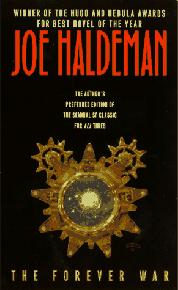

THE FOREVER WARby Joe HaldemanAvon0-380-70821-3272pp/$5.99/1974 |
 |
Reviewed by Steven H Silver
The year 1997, according to Joe Haldeman, will see humanity in an all-out battle against an alien race about whom little is known. The Forever War has already begun when Haldeman's novel, based on his experiences in Viet Nam, begins with William Mandella's induction into the army. Unlike the draftees of the Viet Nam War, the men and women fighting the Forever War were taken from the best and brightest, all college graduates.
Haldeman has several targets in this novel, and his bullets hit each of them reasonably well after twenty-three years. Naturally, the military and authority come in for substantial abuse, but Haldeman also discusses sexual mores, the role of the individual, and alienation, all seen through the eyes of William Mandella.
Mandella enters the army in a world not too different from the world of 1974, although homosexuality seems to be a little more acceptable and free love has become widespread. In the army, he is trained to use highly technical weaponry and become a fighting machine. The army cares little for the soldiers as individuals and death is common among the draftees. When Mandella's Strike Force finally goes into combat against the Taurans, post-hypnotic mind conditioning steps in, not only making the soldiers better finding machines but also removing responsibility for their actions, although Haldeman notes that several still can't cope with the atrocities they committed.
The time dilation aspect of space travel means that Mandella and company return to an Earth where ten years have passed and the world populations hovers near 10 billion. Although they are no longer in the army, the modern world of 2007 has no place for them and most of the soldiers rejoin the army and are shipped off to fight in the wars. Subsequent visits to Earth over the centuries reveal the rise in homosexuality and decline of any lifestyle the soldiers can adjust to. Mandella, Marygay Potter and other soldiers literally find that they have no place in society outside of the army, nor are they wanted. The homosexual society looks on them as freaks and aberrations.
There is very little to separate Mandella from the other characters he comes into contact with. Sure, he is male and Marygay is female, he is heterosexual and Charlie Moore is homosexual, but they are generally interchangeable. While I would like to believe this is intentional, Haldeman pointing to the lack of individuality in the army, if such were the case I would expect to see Mandella becoming less and less of an individual as the Forever War raged on. This is not the case. Nevertheless, the lack of characterization in The Forever War is not the problem that it would be in another book.
Even after nearly twenty-five years, The Forever War stands as a sharp and biting commentary on the military, specifically the military in Viet Nam, but more generally the military as an whole. This novel deserves to be read both within and without the science fiction genre.
